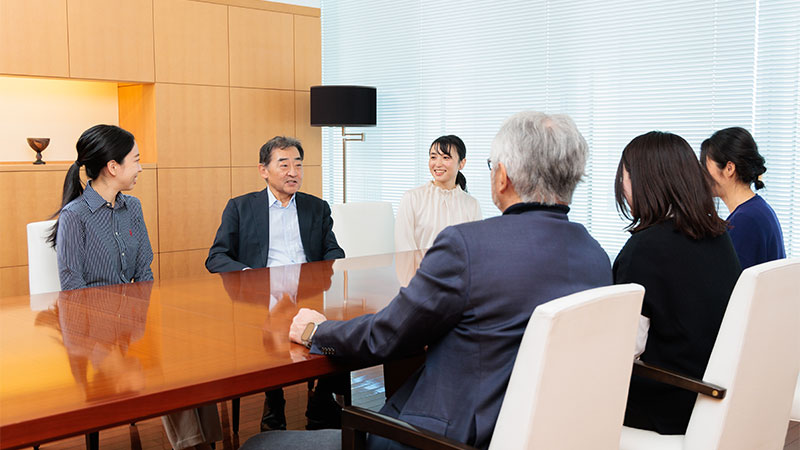Attraction of Tokyo Electron - People and Work Environment Evolving Semiconductor Technology
Culture
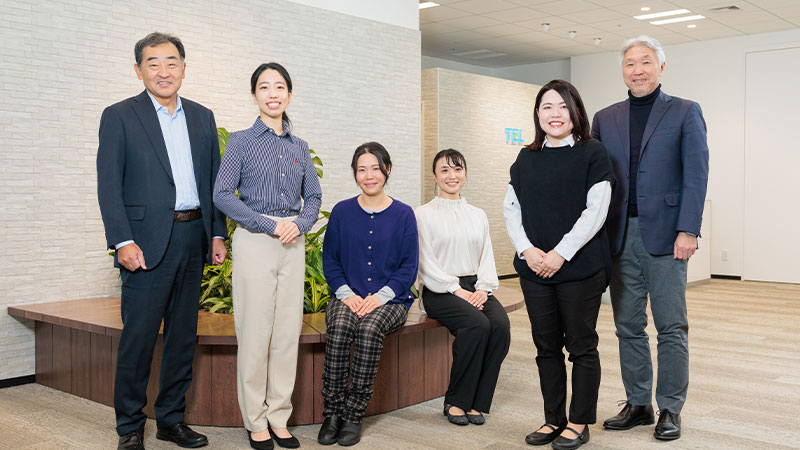
Tokyo Electron (TEL) is vigorously expanding its business in line with the strong growth of the semiconductor market. While implementing measures aimed at improving operational efficiency and productivity, the company plans to add several thousand employees per year and is actively seeking talent from various backgrounds. The move is partly driven by the nature of the semiconductor industry, where technology innovation is rapid and never-ending.
In the following roundtable discussion, four female engineers who are actively engaged in semiconductor technological innovation in Japan, along with two Corporate Officers, shared their views on "TEL's workplace environment".
- The views expressed in this communication are solely those of the author(s) and do not necessarily reflect those of TEL US. TEL US is an equal opportunity employer with separate and unique DE&I programming and initiatives for its workforce.
Profile
-

Rio Shimizu
Tokyo Electron Technology SolutionsJoined TEL in 2008. A group leader in the Development Department, Shimizu is currently working on the development of next-generation technologies that can be used in new applications in three to five years. -

Nanami Yamazaki
Tokyo Electron FEJoined TEL in 2021. As a field engineer, Yamazaki visits overseas customer sites and semiconductor fabs to commission installed equipment and provides in-house technology evaluation and operational support. -

Madoka Okkotsu
Tokyo Electron KyushuJoined TEL in 2012, Okkotsu is a process engineer at the Advanced Technology Development Department. Having studied applied chemistry at university specializing in organic synthesis, Okkotsu began her career at TEL in the fundamental and elemental research section. Her current work is in precision cleaning, a fundamental technology that supports the basic performance of semiconductor equipment. -

Risako Miyoshi
Tokyo Electron MiyagiJoined TEL in 2001, Miyoshi is a mechanical engineering expert in the Design Technology Department with many years of experience in developing gas equipment, devising new functions, and troubleshooting. She continues to work with colleagues and stakeholders to oversee a wide range of gas-related operations, while supporting employee career development and skills training. -

Yoshinobu Mitano
Joined TEL in 1985. Mitano is the Corporate Officer and Executive Vice President & General Manager in charge of the Corporate Innovation Division. -

Takeshi Okubo
Joined TEL in 1985, Okubo is the Corporate Officer and Executive Vice President & General Manager in charge of the Global Sales Division and the Global Customer Engineering Division.
- The information is as of January 2025, when the roundtable was held.
Supporting Individual Challenges: The Workplace Environment at TEL
How would you describe the work environment at TEL?

Shimizu
In a nutshell, it is a workplace environment where motivated individuals are entrusted with responsible tasks. It is an environment that allows each person to leverage their strengths to tackle various projects.

Miyoshi
Recently, the age of my team members has become more diverse, allowing for an active exchange of divergent views regardless of seniority and generational differences.

Okkotsu
For me, what symbolizes the workplace environment at TEL is the atmosphere that allows us to talk to anyone from any background. There are so many different types of colleagues, including a long-time TEL employee, a mid-career hire who has brought us expertise developed at competitors, someone who has had international assignments early in their career, and colleagues from different nationalities... I learn so much from them every day.

Yamazaki
Recently, a young employee in my department was promoted to group leader. Such appointments are hopeful for junior staff like us and serve as motivation.
When I was looking for a job as a graduate student, my lab professor advised me to choose a company that focused on supporting and hiring serious students. I took his advice and chose TEL, because I felt the company appreciated how serious I was about my research. That feeling continues today: TEL always has every employee’s back.
What kind of support is available?

Yamazaki
Tokyo Electron Technology Solutions where I work holds networking events for female engineers and others at TEL sites in Tohoku. Being able to connect with women who work as engineers in a similar environment helps us perform effectively in our jobs.
This is particularly significant because, when I first joined my department, I was the first female employee. With several international business trips over the course of a few months, I struggled to find time or opportunities to connect with other female engineers within the company, so the networking events were a delightful occasion. The events provide a valuable space where we can share our work approaches and discuss the unique challenges we face as women, allowing us to understand each other on a personal level.

Shimizu
I understand that there are also regular gatherings for employees of foreign nationalities working in Japan, such as dinners and meetings to exchange experiences. Some participants say these meetings are great opportunities to network and share tips, not only about work, but also about expat issues such as visas and the “My Number” (social security and tax number) system in Japan. There are also social events for spouses and partners of assignees to Japan.

Mitano
I’m sure this kind of resident support is essential for our foreign colleagues.

Okkotsu
Speaking of support outside of work, I’m grateful for TEL’s telecommuting program. I’m raising two children, ages 4 and 6 and it’s hard for me to be in the office all day. The program allows me to work from home for 1.5 hours early in the morning so I can leave the office early in the evening. This allows me to work full time while taking care of my children.

Miyoshi
I, too, take advantage of the telecommuting and flextime programs. They give me the flexibility to adjust my work schedule if, for example, my child has a difficult morning or needs to be taken to a clinic during the day. The same goes for elder care and my own medical appointments. These programs improve the way many of us work, and both managers and employees are very understanding.


Mitano
It is reassuring to know that employees and managers are flexible in their approach to these programs. I hope this atmosphere and culture will spread throughout the company. If not, the leadership team should take the initiative to make it happen. It would be a shame if some employees had to sacrifice their careers because of the need for child care and elder care.

Yamazaki
How does the company identify other necessary initiatives and programs?

Mitano
TEL views employee engagement as a Key Performance Index (KPI) and conducts regular surveys and listening sessions. Based on the results, we identify employee needs and issues and work to improve programs on an ad hoc basis.

Miyoshi
As a result of these diligent efforts, TEL’s programs for women seem to have improved significantly since I joined the company over 20 years ago. Traditionally, engineers have predominantly been male in any country, but recently, the number of female employees at TEL has been increasing. I believe this represents an opportunity to further enhance a work environment that is accessible and comfortable for everyone.
Positive Support That Resonates with Individual Circumstances and Values
What kind of support do you think is necessary for a more diverse workforce to thrive?

Okkotsu
I believe it is essential to understand and respect individuals' perspectives on their ways of working.
For example, I had a dilemma at work when I was pregnant. A senior colleague who had been pregnant said that she had been advised not to work in a cleanroom, not only because of the health risks, but also because it would set a precedent and put pressure on other pregnant women to continue working in a cleanroom.
However, as someone who has gone through pregnancy and childbirth, I believe that there is not one right way for pregnant women to work and that we should be given more choices because our work philosophies and health conditions differ from one person to another.
In fact, the senior colleague I mentioned agreed with me. Later, when I became pregnant, she told me to ignore the fact that she had worked in the clean room until just before giving birth and advised me to work as I saw fit. So, I did. As diversity becomes more important in society, we should respect inclusivity such as the opinions and work styles of those we are looking out for. The experience I mentioned made this message very clear to me.


Shimizu
As a group leader of a multinational team, balancing fairness of opportunity with task assignment can be difficult, especially when gender, nationality, and personal characteristics are added to the mix. The key is to understand the individual and personalize support. To that end, I schedule a one-on-one meeting with each member of my team. I also make it a rule to see and talk to them often, which is really the most important practice.

Mitano
I agree that face-to-face conversations can be very effective. That's why I walk around the office at least once a day. I can often tell by the look on people's faces if they have a burden on their minds. Even though more and more people are telecommuting and teleconferencing, I think it is important to find ways to get face time with each other.

Okubo
Face-to-face conversations may be old-fashioned, but they still matter. You could arrange to have lunch with people from other departments or do something that helps you communicate more with others. Then you will get to know them as individuals with interesting characters.

Shimizu
There are some tasks that female engineers may not be as equipped to do, such as picking up and carrying large and heavy components. This used to bother me when I was still new to the company, but I’ve received support and have been comforted by the group leader who told me not to worry and to concentrate on the things that only I can do. I’ve tried to adopt this attitude ever since, and I believe it has made me a more valuable employee.

Yamazaki
That happened to me, too. A colleague who is a field engineer once said to me, “You may not be able to carry heavy objects, but you have the brain to instruct others to get things done. That’s the role you’re meant to play.” Those words lifted a weight off my shoulders. I believe that such words of encouragement are one of the great supports.

Okkotsu
I want the workplace to be a place where everyone can freely express their opinions, viewpoints, and ways of working. People are often reserved in formal settings, such as regular meetings with managers and colleagues. I hope to have opportunities where we can casually talk about my preferred working styles and personal concerns during office chats.

Shimizu
As the number of employees increases, casual interaction may become less frequent, which leads to potential management challenges. I believe that efforts to naturally foster communication are essential.
My team has discussed this and is considering placing a communal box of sweets in the break room so that members can gather and have casual conversations. There are several break rooms, but this ploy will draw members into the same room and communication will naturally follow.

Okkotsu
I love that idea! Speaking of new ideas, Tokyo Electron Kyushu has started a three-month mentoring program for relatively new female engineers. If we have more initiatives like this, I’m sure the workplace will become even more open and accessible than it already is.
In addition, our voices have been heard and have led to a number of improvements, including the introduction of navy blue cleanroom suits that women can wear during their menstruation cycle. While female engineers may still appear to be a minority when looking solely at numbers, such steady improvements in the work environment contribute to the feeling that we are being recognized and valued.

Shimizu
However, while providing support that is attuned to each individual is important, it could sometimes be misinterpreted as favoritism, especially when support for women, expatriates, and other minority groups seems excessive.
For example, networking events for female engineers are held every month or two, while those for male engineers are held only about once every three years. There are mitigating factors, such as the sheer number of male engineers and the abundance of opportunities for them to interact with each other, but there may be grounds to argue inequality of opportunity. To be fair, I think there could be more social events that male engineers are free to attend.
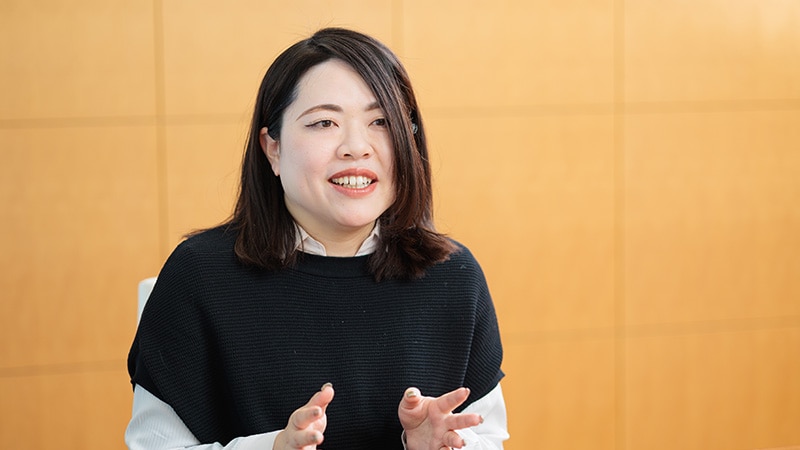

Mitano
True. For now, however, in our efforts to enhance the overall work environment, we prioritize minority groups including women and expatriates, who are the majority of the minority groups. I hope people find this policy reasonable.

Yamazaki
I think TEL employees in their 20s and 30s are already embracing the idea of “respecting diversity” thanks to various company initiatives and general trends in society. But when we face real problems at work, it’s not always easy to find solutions.
Personally, in occupations like mine, which involve repeated overseas business trips lasting 2-3 months, even if there are established maternity leave systems, I'm worried about whether I'll really be able to return to work after giving birth, and whether I'll be able to continue working while raising the child. That’s why I’m glad I listened to your experiences as working mothers today. I now feel that there is much to hope for.

Mitano
Currently, the percentage of TEL employees returning to work after parental leave is 100% in Japan, which should be reassuring on paper. But I understand your concern, Yamazaki-san, because your job often takes you overseas to commission installed equipment, and this may interfere with raising children. However, I’m sure there are many areas and opportunities where you can use your experience as a field engineer to build your career after having children, taking full advantage of remote work and telecommuting.
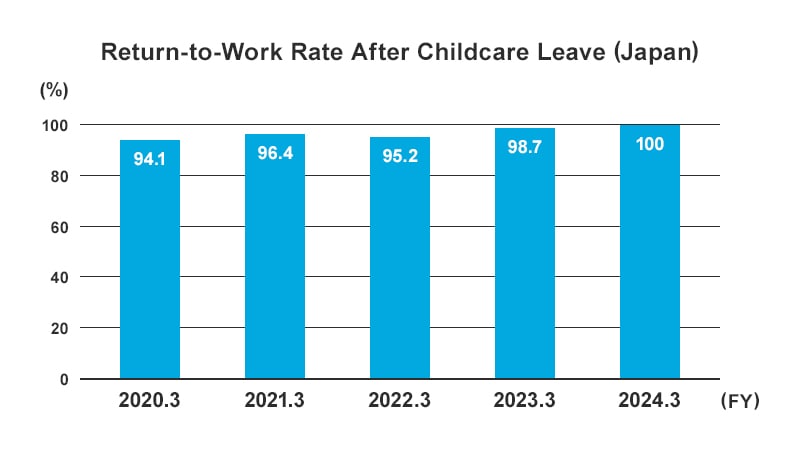

Okubo
Advances in technology will provide field engineers with more convenient tools, including remote teaching and remote recipe setup. Using advanced AR/VR glasses, experienced engineers could observe remote sites and instruct workers from anywhere. AI will soon enable instant translation of conversations, making it easy to communicate with anyone, anywhere, in any language. Despite these advances, business travel abroad will still be necessary in some cases. What the company can do is take appropriate steps to reduce the inconvenience of such travel. The company and the employees involved should discuss the matter in detail and take corrective action.

Yamazaki
Indeed. It is great that the company encourages each of us to overcome our worries.
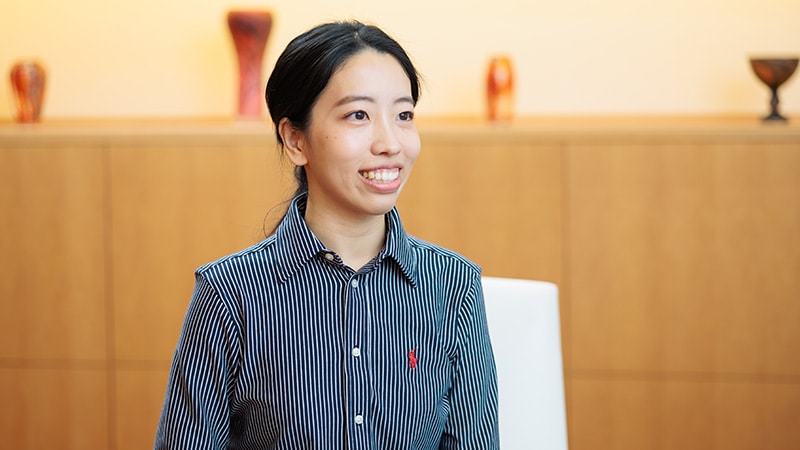

Miyoshi
Absolutely. In addition to that, I hope to see more education and training programs that focus on communication. The majority of mechanical engineers are men, and I have always been in the minority for about 20 years of my engineering career. My minority status has led me to several challenges, including limited opportunities to express my opinions effectively and difficulties in understanding non-verbal cues.
I think it’s important for all of us to recognize that there are different people with different sensitivities, and that it’s wrong to judge others based on our own insular criteria. If we share a respect for diversity and learn how best to communicate to achieve common goals, the work environment will be greatly improved.

Yamazaki
Both the company and the employees will realize that maintaining smooth mutual communication and a balanced relationship among diverse members is crucial. Since I spend half a year on overseas assignments, I take it upon myself to communicate the concerns of my overseas colleagues to the Japanese side. Conversely, if there are policies being pursued in Japan that are not yet well known abroad, we should make an effort to inform and reassure our overseas counterparts.

Okubo
Another important approach is organizational reform. One example is the Global Customer Engineering Division, which was inaugurated in July 2024. The division announced several changes and outcomes it wants to achieve, including a communication-related goal. Specifically, the division aims to bridge the distance between TEL’s global field engineering functions and fab development sites by establishing channels for more direct and immediate communication. It will take considerable time and energy to build such an infrastructure, but we are moving forward with the project because the benefits will be substantial.
Our Corporate Growth Is Enabled By People, And Our Employees Both Create And Fulfill Company Values
Finally, tell us where TEL goes from here and what steps the management team plans to take.

Mitano
In 2016, Kawai-san became President & CEO, and TEL has based its business activities on "the happiness of employees and their families." Even before terms like “diversity” came into vogue, TEL sought to develop the unique strengths of its employees and evaluate them impartially based on their abilities. In my overseas assignments, I’ve seen many female engineers in prominent roles. This made me wonder why there were so few women in leadership positions in Japan, and why their work environment was not changing for the better.
And then I realized that the problem was not a lack of talent in Japan, but the inability of the management to fully utilize people’s potential. We cannot continue to produce superior products without tapping into the still undervalued abilities of women, expatriates, and older workers. Historically, TEL’s growth has been accelerated by unique individuals who can think outside the box. In the semiconductor industry, innovation is fast and never-ending, and we need to hire a wide range of unique talents to develop breakthrough technologies.
In addition to mechanical and electrical engineering majors, we plan to reach out to pharmacy, chemistry, and social science majors, as well as women’s colleges, even though on the surface they may seem foreign to TEL’s business.
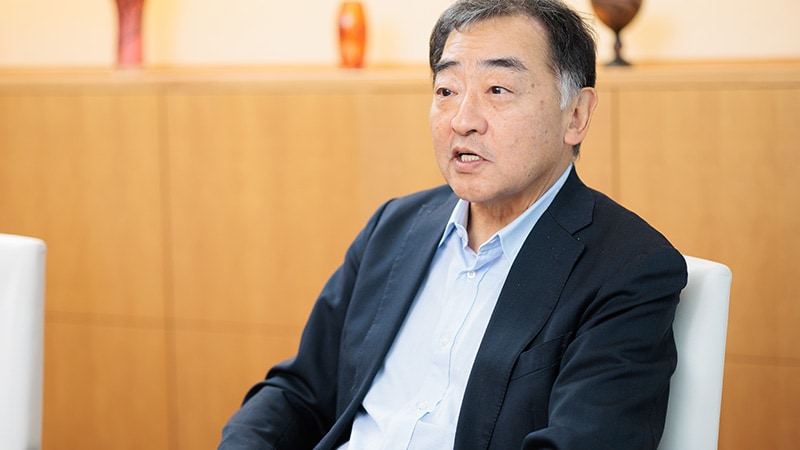

Okkotsu
My team deals with materials analysis, and on some occasions a member with extensive knowledge of molecular bonding and molecular analysis equipment has played a critical role. So far, a large percentage of the new graduates joining TEL have come from electrical and mechanical engineering backgrounds, but I’m convinced that knowledge of pharmacology and chemistry will also be very useful. Recruiting members with diverse expertise will bring a breath of fresh air to the organization.

Okubo
That’s true. People are the key to gaining a competitive edge in the technology race. It is said that innovation comes from organizations and groups that embrace diversity. However, there has been a “talent war” or a competition for promising human resources, making it challenging for us to achieve our goal of hiring 10,000 people over the next five years.
In addition to recruiting, it is also important for the TEL Group to maximize the capabilities of its existing 18,000 employees. Ours is an industry where male employees far outnumber female employees, but TEL should expand career opportunities for experienced female employees (present company included, of course) to make us more competitive. This applies to all business areas, not just technology development. TEL will continue to create an environment and culture where all of us, regardless of nationality and race, respect each other and turn individuality and differences into strength.
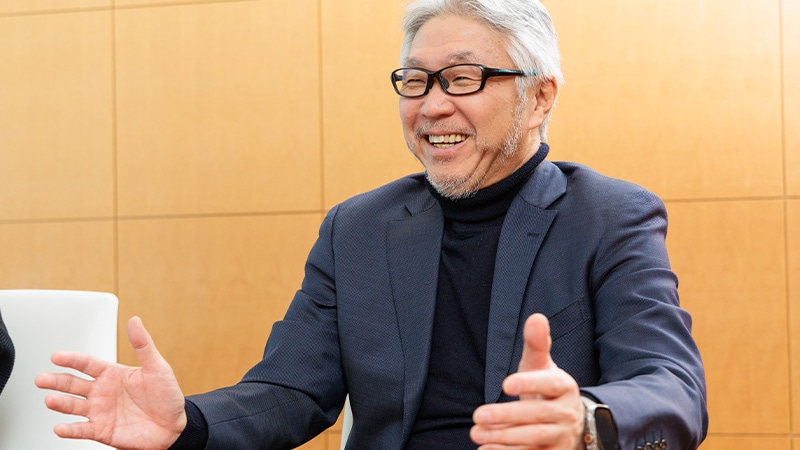

Mitano
Some issues may take longer to solve, but the management team is united in its efforts to promote diverse skillsets and backgrounds at TEL and to improve the environment in which all individuals can perform to the best of their ability. If you have any concerns, please don’t hesitate to let us know and help us find solutions.

Yamazaki
Thank you very much. May we contact you directly?

Mitano:
Yes, of course! We’d like to hear your honest opinions about the workplace.
